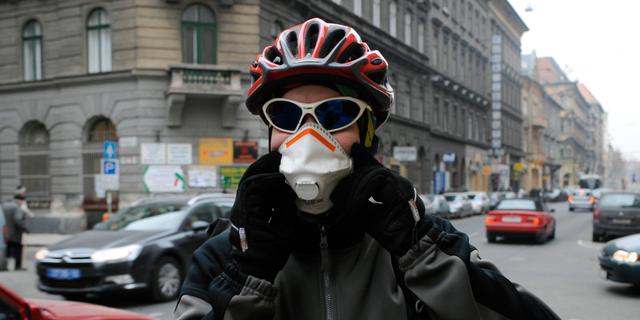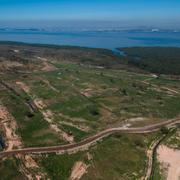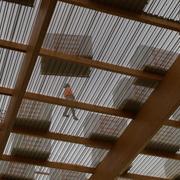
Archive image. A bicycle messenger in Budapest using a mouthguard. Bela Szandelszky / AP
The global challenges
Dangerous air in large parts of Europe – Sweden exception
Most Europeans are forced to inhale harmful air, according to The Guardian, which calculated the amount of harmful air particles in large parts of Europe.
Air pollution is said to cause a wide range of medical problems and lead to over 400,000 Europeans dying prematurely each year. According to experts, at least half of these lives could be saved if our collective air quality only stayed below WHO's limit numbers.
The worst is the situation in North Macedonia, where the measurements show six times as much harmful air as the limit number.
In general, the situation is worst in Eastern Europe. The exception is northern Italy, where the air carries four times as many health-damaging airborne particles as compared to the limit number.
Sweden stands out in a positive respect. North of Svealand, the limit number is met, and for the southern parts of the country, no part ends up exceeding the double limit number, writes The Guardian.

A former landfill in Brazil that has been restored – and thus can sell emissions rights. Brown Prado / AP
39 out of 50 creators of emission rights are "rubbish"
Many of the investments used to offset carbon dioxide may be completely useless. This is reported by The Guardian, which reviewed 50 of the largest projects together with the non-profit organization Corporate Watchdog. Of them, 39 are judged not to do anything new for the climate at all.
Companies that store carbon dioxide or otherwise contribute to the transition can then sell the corresponding quotas to other companies. It is a similar system to the one used within the EU's trading of so-called emission rights.
According to The Guardian, $1.6 billion worth of carbon offsets have been created by projects the paper classifies as "junk" or "likely to be junk."
- The problems are far-reaching and pervasive and extend far beyond individual verifiers. The voluntary emissions market is actively exacerbating the climate crisis, says Anuradha Mittal, at the Oakland Institute think tank to The Guardian.

Construction work in Paris. Illustration image. Lewis Joly / AP
A new Paris is built every five days – accounting for 37 percent of the world's emissions
Every five days, buildings equivalent to a new Paris are erected all over the world, according to a new heavy report from the UN environmental program UNEP. This is reported by TT.
Construction of housing, among other things, accounts for as much as 37 percent of global climate emissions. In Sweden, the construction and property sector accounts for around 20 percent of emissions.
In the report, UNEP writes that construction's climate footprint and impact on ecosystems can be reduced if recycling is prioritized before new construction and materials with a high environmental impact are replaced with bio-based ones.
By, for example, replacing construction with solid wood with more material-efficient methods, many trees would be saved.
- With the same amount of wood, you can get four houses instead of one, says Martin Erlandsson, researcher at IVL Swedish Environmental Institute and adjunct professor of building materials at KTH, to TT.
Inga kommentarer:
Skicka en kommentar